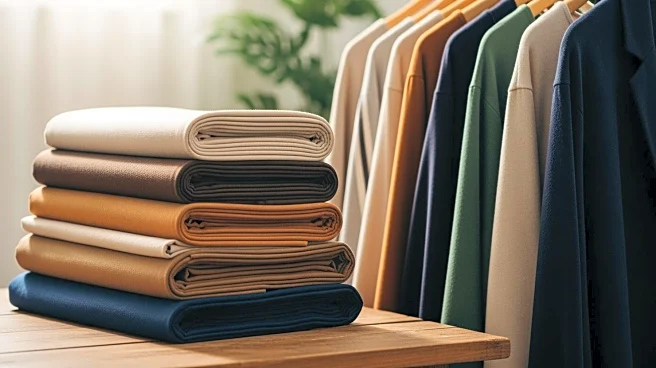What's Happening?
Recover, a Spanish company specializing in recycled cotton fibers, is expanding its operations by launching two new business lines: 'Recover Fabrics' and 'Recover Blanks'. 'Recover Fabrics' offers a range
of finished, low-impact textiles made from patented recycled cotton fibers, available to fashion and textile companies. This initiative aims to make sustainable fibers more accessible across the industry. 'Recover Blanks' is a white-label brand providing basic, unbranded garments such as T-shirts and sweatshirts, designed for businesses seeking sustainable options. The company collaborates with Iberian manufacturers like TMG and Textil Santanderina to offer over 50 fabric types across four collections, catering to both large corporations and small brands.
Why It's Important?
The launch of 'Recover Fabrics' and 'Recover Blanks' represents a significant step towards sustainability in the fashion industry. By providing accessible, low-impact textile solutions, Recover addresses challenges such as supply chain complexity and inconsistent quality standards. This move could influence industry practices, encouraging more brands to adopt sustainable materials. Large retail chains and emerging brands alike stand to benefit from easier access to high-quality, environmentally friendly fabrics, potentially leading to a broader shift towards sustainable fashion production.
What's Next?
Recover's expansion into finished fabrics and garments is likely to drive further adoption of recycled cotton fibers in the fashion industry. As brands integrate these sustainable options into their offerings, consumer demand for eco-friendly products may increase. The company's collaboration with manufacturers like TMG and Textil Santanderina could lead to more innovative textile solutions, enhancing the quality and appeal of sustainable fashion. Stakeholders in the industry may respond by investing in similar initiatives, further promoting sustainability.
Beyond the Headlines
Recover's initiative highlights the growing importance of sustainability in fashion, reflecting broader environmental concerns. The company's focus on democratizing access to sustainable fibers could lead to ethical shifts in production practices, reducing the industry's environmental footprint. This development may also influence consumer behavior, as awareness of sustainable options grows, potentially driving demand for eco-friendly products and encouraging brands to prioritize sustainability.










